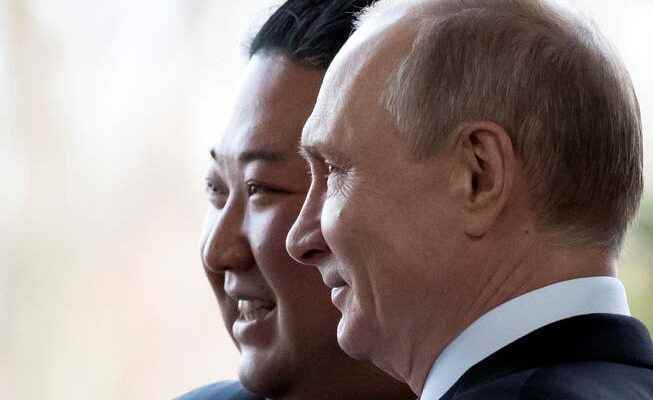North Korea and Russia vow to expand ties. Kim Jong Un hopes for foreign currency and diplomatic backing.
Vladimir Putin and Kim Jong Un at a summit in Vladivostok.
Vladimir Putin started the series of testimonies of friendship: North Korea and Russia are linked by a tradition of partnership and cooperation, he wrote to the ruler in Pyongyang, Kim Jong Un, on the anniversary of the liberation from Japanese colonial rule (August 15, 1945). In the letter quoted by North Korea’s state media, Russia’s rulers advocated expanding bilateral relations. This is in the interest of both states.
Kim Jong Un responded to the advances from Moscow and in a reply appealed to friendship among comrades. In all areas, relations would deepen. He also wished Putin every success in “defending Russia’s sovereignty”; obviously a reference to the Ukraine war.
Recognition of separatist areas
What will become of the airy announcements is difficult to estimate. However, North Korea has recently expressed its loyalty to Russia in very concrete ways. When Putin recognized the so-called People’s Republics of Donetsk and Luhansk in the Donbass as states, North Korea diligently followed suit – the only other country apart from Syria. Already after the annexation of Crimea, Kim showed solidarity with Putin.
Meanwhile, Russia, internationally isolated since the attack on Ukraine, is giving the North Koreans diplomatic backing. In May, Russia and China blocked a resolution at the UN Security Council aimed at tightening sanctions against Kim’s dictatorship. The background is the North Korean nuclear weapons and missile program. North Korea conducted over twenty tests this year alone. The American government suspects that ICBMs or at least components of them were also deployed.
Forced laborers as foreign exchange procurers
The Russian government joined the United Nations sanctions in 2017. Russia has previously supported Security Council resolutions condemning the nuclear weapons program. Kremlin spokesman Dmitry Peskov publicly criticized North Korea for declaring its willingness to use nuclear forces. However, Moscow is suspected of undermining the punitive measures. Russian companies are said to help handle exports of coal and oil and thus circumvent the sanctions regime.
Russia is also helping out in an extremely lucrative line of business: the North Koreans provide workers for Russian construction sites or factories. They are treated like forced laborers; most of the salary goes directly to the regime. This labor export runs counter to efforts to cut North Korea’s foreign exchange inflow. North Korean workers were temporarily sent back to their homeland. However, Pyongyang later commanded new workers’ brigades. In 2019, at a summit with Kim, Putin praised the migrant workers for being conscientious and law-abiding. According to media reports the North Koreans even offered to send workers to Donetsk last month; ostensibly for post-war reconstruction.
Years ago, Russia was willing to deport “Refugees from the Republic” to North Korea. This is despite the fact that citizens of the Kim dictatorship who leave the country without permission face harsh penalties ranging from labor camps to execution.
Abrupt end of cash flows
The relationship between the two neighboring countries, which share a 17-kilometer border, was subjected to a severe test after the collapse of the Soviet Union. In one fell swoop, the Kim dynasty lost the enormous flow of money from Moscow. As a result, North Korea fell into a severe economic crisis in the 1990s. Hundreds of thousands are said to have starved to death. Years of wrangling between Moscow and Pyongyang over loan repayments followed. Only in 2012, after Putin’s re-election as head of state, did Russia waive 90 percent of the debt of the comrades in Pyongyang.
Against the background of its diplomatic isolation, Russia is obviously also refreshing its contacts with other pariah states in Asia. At the beginning of the month, Foreign Minister Sergei Lavrov paid a visit to the internationally outlawed military junta in Myanmar. A few days earlier, four political prisoners had been executed in the Asian country.
